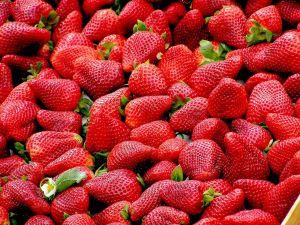You are here
- Home
- IAA Funded Project with Food Safe Ltd.
IAA Funded Project with Food Safe Ltd.

AstrobiologyOU scientists to evaluate efficacy of pesticides and bacteria removal from fresh fruit and vegetables
The worldwide consumption of ready-to-eat fresh fruit and vegetables has increased with the global effort to improve health and nutrition. However, it has been estimated that on average a piece of fruit will have been handled by seven different people before the customer consumes it.
A 2020 FSA report highlights that there are 2.4 million cases of food poisoning annually in the UK with a cost to society of £9.1 billion per year. Microbial contamination can occur at any stage in the farm to fork chain and consumers are advised to wash their fresh fruit and vegetables before use.
The escalating demand for food production has also led to an increasing use of pesticides, which results in hazardous chemical residues on fruit and vegetables.
Official UK figures from November 2020 revealed 12 products that are most likely to contain cocktails of potentially hazardous pesticides. The ‘Dirty Dozen’ list was topped by strawberries with almost 90 percent of those tested containing residues of more than one pesticide. Lemons and pre-packed salad leaves came a close second and third, with pesticides found in more than 80 percent of tests. Individual samples contained the residues of up to 14 different pesticides.
We have partnered with Food Safe Ltd, a UK company that manufacture, package, and distribute a range of food hygiene formulations. The products are designed for home use to actively wash fresh fruit and vegetable, to help remove farm sprays and surface organisms.
We will use the latest in-house laboratory techniques and instrumentation available to AstrobiologyOU and Morgans' Applied Science & Technology Group, based on microbiological and gas-chromatography-mass spectrometry analysis, to investigate the ability of the company’s products to remove surface bacteria and to reduce the pesticide load from fruit and veg samples.
The detailed validation of the products’ efficacy will add weight to the sales efforts whilst improving the safety and health of the consumer, especially given the added awareness on hygiene as a result of the Covid-19 pandemic.
Funding for this six-month research project was secured following a successful proposal to the STFC Impact Accelerator Account.
PI- Geraint Morgan
CO-Is - Karen Olsson-Francis, Ceri Gwyther, Yiannis Tsamis and Sonia Garcia Alcega
Latest News
- Congratulations Professor Geraint (Taff) Morgan! 8th April 2025
- AstrobiologyOU 5 Year Report 4th March 2025
- PhD Opportunities Open For Applications 13th November 2024
- A potential breakthrough in battle against antibiotic resistance 23rd September 2024
- Introducing Professor Schwenzer 19th July 2024